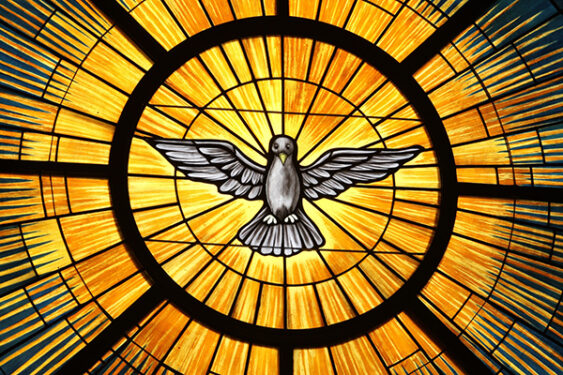
Fifth in a series
In “The God of Space and Time” (New York: Holt, Rinehart and Winston, 1960, pp. 208, $4.95) Bernard Cooke discusses how God in the Old Testament helped the Jewish People to grow in holiness as His people and distinguishes that relationship from the relationship that the risen Christ has with the Christian community. He makes a distinction between an extrinsic relationship and an intrinsic relationship. He suggests that God’s relationship with His people as presented in the Old Testament was an extrinsic relationship. While God showered blessings on his people, God never became part of the people. Cooke writes the following:
“Perhaps one might distinguish the New Testament from the Old Testament state of sacralization by saying that the former is more ‘intrinsic.’ During the centuries of Israel’s career, God watched over his people, guided and directed and protected them, but always, as it were, from the ‘outside.’ Yahweh himself was never a part of the people. In the New Testament situation, on the contrary, the risen Christ works intrinsically. He himself is immanent to the life of the community; he functions as the ‘head of the body’ and communicates to it his own animating Spirit. The providential guidance of history is from the ‘inside.’ (pp. 191-192)
That Christ is the Head of the Mystical Body and that I am a member of that Body has all sorts of implications. My membership should influence not just what I do on a Sunday morning but what I do the other days of the week. I think that the more deeply we believe that we are members of the risen Christ’s body, the more free we become to fulfill our vocation to be witnesses. The presence of the risen Christ and His Spirit should free us and encourage us in our efforts to participate in our own sacralization and in the sacralization of the world.
It should never happen that problems within the church excuse Christians from their vocation to bear witness to the presence of the risen Christ in the church and through them to his presence in the world. The vocation of the Christian to bear witness to the risen Christ may at times seem a very difficult vocation to fulfill, but because of the presence of Christ’s Spirit, while disappointment at times may be a proper response, I don’t think discouragement ever is. The power of God’s presence and love cannot ultimately be defeated. Hope is an essential virtue for any follower of Christ.
Cooke writes beautifully about the Mystical Body’s presence in history:
“The sequence of events that makes up the Church’s pilgrimage through time stands somehow at the center of mankind’s history. It is a sacred thread that runs through the complex evolution of man’s existence in time, giving it meaning and ultimate purpose in relation to the risen Christ. The history of the Church and the evolution of its life of faith and hope and love, involved with and involving the broader development of mankind as a whole, is meant to be a process of working out in human life the implications of the death and resurrection of Christ. This does not mean that the risen Christ gives over to the Christian community the task of continuing after him the work he began; he remains active in human history, working in and through the Christian community to which he is dynamically present.” (p.190)
I find this vision of Christian life breathtaking. Christian believers should be aware that they are involved in an exciting adventure, indeed the most exciting adventure. It is also a very challenging adventure. The stakes are very high. Whatever disappointments, troubles, or temptations might become part of the adventure, the challenges should never be boring. Many years ago, a book about Christ was published that had the title “The Greatest Story Ever Told.” Reflection on that story reveals that Christian believers are part of that story. The ultimate meaning of their lives is tied to the mystery of Christ.
But it is not just Christians who are part of Christ’s story. Everyone is involved in Christ’s story, even those who describe themselves as unbelievers. I don’t wish to give the impression that only Christians carry on Christ’s mission. The Holy Father has said that he is convinced that God is part of everyone’s life. People of goodwill who for some reason do not believe that Christ is God the Father’s Word may also be building a world of truth, justice, and love. I think if we look at the contemporary world we can discover many wonderful actions performed by people who describe themselves as unbelievers. My opinion is that such people may be close to God even though they, for some reason, cannot consciously profess God’s existence. The Holy Spirit breathes where He will.
Father Lauder is a philosophy professor at St. John’s University, Jamaica. He presents two 15-minute talks from his lecture series on the Catholic Novel, 10:30 a.m. Monday through Friday on NET-TV.
